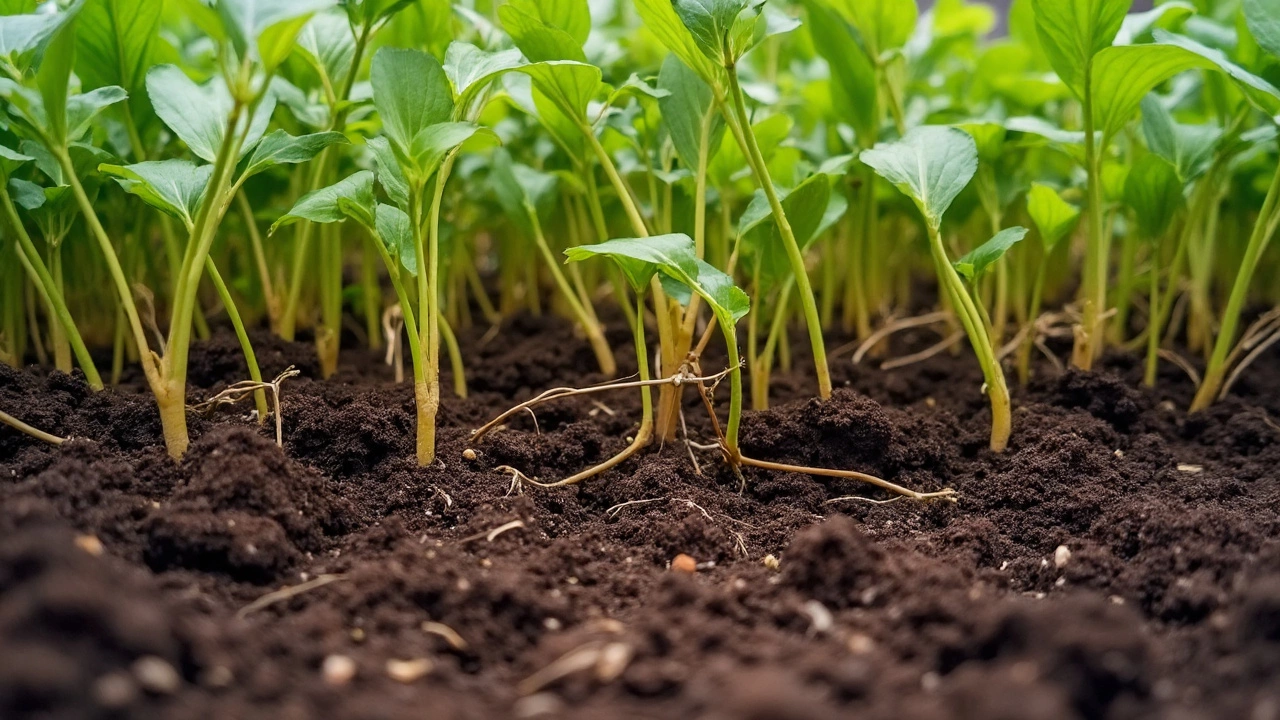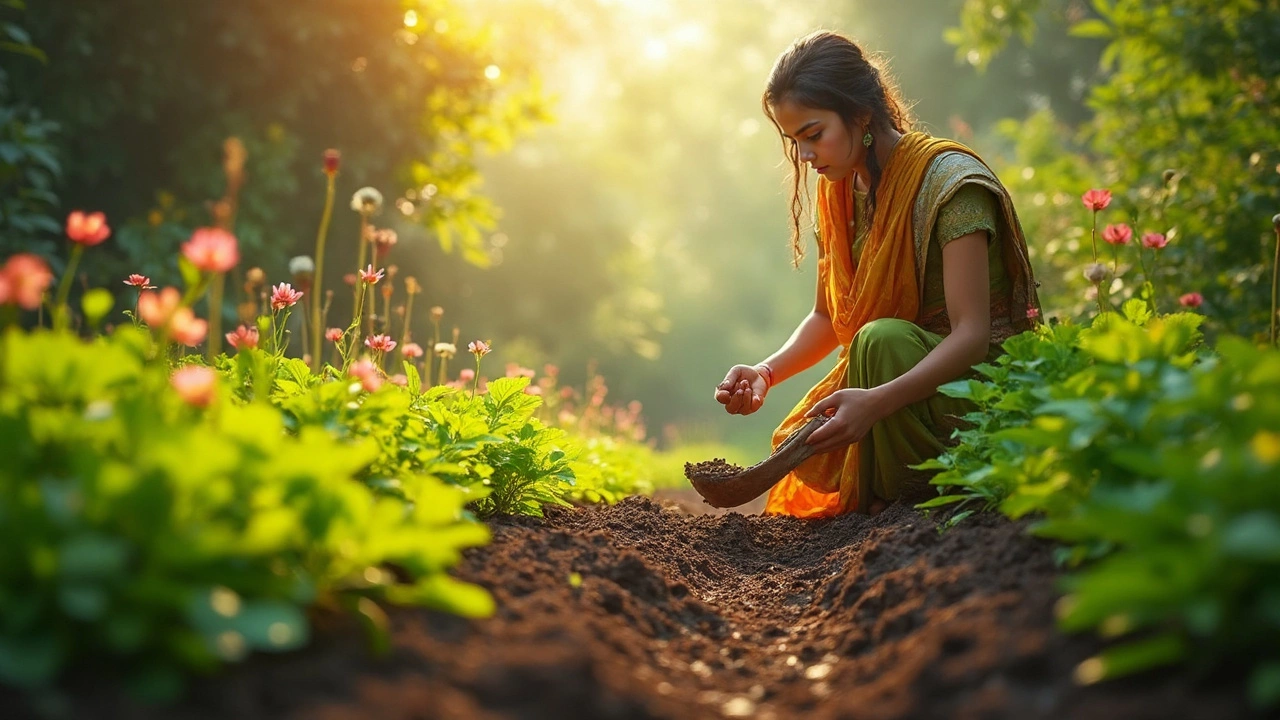Ever considered the humble worm as your garden's little hero? It might be time to start! When it comes to organic gardening, worm castings can make a world of difference. Imagine it as poop with purpose, a natural fertilizer that works wonders without synthetic additives.
Worm castings are basically the digested waste of worms. They might sound simple, but they pack a punch for your garden. Loaded with nutrients that plants adore, they help increase soil fertility and boost plant growth. Think of them as a natural, turbo-charged energy drink for your plants!
Unlike many chemical fertilizers, worm castings are all about working with nature. They improve soil structure, making it crumbly and airy, allowing roots to breathe and water to seep through easily. So, if you want lush growth and vibrant plants, worm castings might just be your new best friend.
- The Magic Hidden in Worm Castings
- Nutrient Packed Powerhouses
- Improving Soil Structure
- Environmentally Friendly Gardening
- Applying Worm Castings in Your Garden
The Magic Hidden in Worm Castings
Worm castings might not look all that spectacular at first glance, but these little nuggets are packed with natural goodness your garden will love. People often overlook them because, hey, they're essentially worm poop! But here's why they're the unsung hero in gardening.
First off, worm castings are super rich in nutrients. They contain essential plant nutrients like nitrogen, phosphorus, and potassium—basically the stuff that makes plants happy and healthy. Unlike synthetic fertilizers, these nutrients are released slowly, providing a steady supply of nourishment over time. This means your plants don't just get a quick sugar rush; they enjoy long-term growth support.
But it's not just about nutrients. Worm castings help bring healthy bacteria and microbes to the soil. These tiny critters aid in breaking down organic material, which further enriches the soil. Think of it as a whole ecosystem working together to give your plants a thriving environment.
Want an added bonus? Worm castings don't burn plants. Ever accidentally dumped too much fertilizer and watched your plants cringe? With worm castings, there's no risk of overdoing it, so you can sprinkle to your heart's content without the worry of damage.
If you're curious how worm castings stand against traditional fertilizers, here's a small comparison:
| Component | Worm Castings | Chemical Fertilizers |
|---|---|---|
| Nutrient Release | Slow, steady release | Quick, often leading to burn |
| Environmental Impact | Eco-friendly, no chemicals | Potential for runoff and pollution |
| Soil Health | Improves structure and life | May degrade soil over time |
Worm castings also help improve soil structure, making it fluffy and allowing water and air to move more freely. This makes life easier for plant roots and helps prevent soil from compacting, which is super crucial for root health.
All in all, whether you're new to gardening or a seasoned pro, using worm castings is a no-brainer for anyone looking to boost their soil health naturally without any fuss or damage. So, next time you're out gardening, remember to consider these little miracles in your planning.
Nutrient Packed Powerhouses
When it comes to boosting your soil’s nutrient levels naturally, worm castings are gold. They're like a multivitamin for your garden! These little nuggets are filled with essential nutrients that plants love, like nitrogen, phosphorus, and potassium, but in forms that are super easy for plants to absorb.
Not all that glitters is gold, but in this case, there's some truth to it. The high concentration of humus in these castings acts as a slow-release fertilizer, meaning your plants get a steady diet of nutrients over time rather than a quick burst that might wash away with the first rain.
| Nutrient | Content in Worm Castings (% by weight) | Role in Plant Growth |
|---|---|---|
| Nitrogen | 0.5 - 1.5% | Encourages leafy growth |
| Phosphorus | 0.2 - 0.5% | Supports root development and flowering |
| Potassium | 0.5 - 0.7% | Enhances overall plant health and disease resistance |
But wait, there’s more! Worm castings also contain beneficial bacteria and microorganisms that help break down organic matter in the soil, making even more nutrients available to plants. Plus, these tiny helpers improve soil biota, which is the community of organisms living in the soil that are crucial for healthy plant growth. It’s like having a team of gardeners working under the soil surface!
Next time you're thinking about fertilizing your garden, consider skipping the chemical route. Instead, use the natural power of worm castings to give your plants exactly what they need. It's a win for your garden and a high-five for the planet.

Improving Soil Structure
Think of soil structure like a cake. You don't want it too dense or too crumbly, right? Well, worm castings help create that perfect 'cake' balance in your garden soil by working as an excellent soil conditioner.
Here's how they do it: the organic matter in worm castings binds soil particles into aggregates, which means your soil won't compact easily. This is especially important for clay soils, which can become like concrete when dry. With improved structure, water retention gets a major boost, and these little aggregates also make sure that excess water drains away, preventing root rot.
And it’s not just about water. That airy soil structure means roots can stretch and grow with ease, pulling in vital nutrients effortlessly. This kind of hospitable environment encourages beneficial microbes to flourish. They break down organic material, releasing nutrients slowly, which is like a balanced diet for your plants.
Want to see this in action? Try mixing worm castings with your soil directly or gently top-dress your garden. A little goes a long way, but the effects are significant. Picture your plants reaching their leafy arms up in gratitude!
If numbers are your thing, check this out:
| Soil Type | Percolation Rate |
|---|---|
| Sandy Soil | High |
| Clay Soil | Low |
| Soil with Worm Castings | Optimal Balance |
From sandy to clay, worm castings can adjust the soil’s properties to sweet spot conditions. Their magical mix of nutrient and organic content helps nature do what it does best, creating a thriving ecosystem right under your plants.
Environmentally Friendly Gardening
Being kind to Mother Earth doesn’t mean settling for less vibrant gardens. Enter worm castings – the rock stars of organic gardening. If you’re looking to grow plants without harming the environment, using worm castings is a smart move.
First off, they’re the ultimate organic fertilizer. Unlike chemical fertilizers that might leach into waterways and cause harm, worm castings release nutrients slowly. This means plants get what they need over time, reducing the risk of nutrient runoff and environmental pollution.
Moreover, using worm castings boosts biodiversity in your soil. They foster populations of beneficial microbes and microorganisms, breaking down organic matter and contributing to soil health. This is crucial because healthy soil is the backbone of sustainable gardening.
Concerned about water usage? Worm castings hold moisture like a sponge due to their texture, reducing the need for frequent watering. That’s a double win of saving water and growing strong plants.
Also, if you’re keen on minimizing waste, worm castings tie in perfectly with composting. Imagine creating a cycle where kitchen scraps turn into garden gold through vermicomposting, cutting down on landfill contributions.
To give you an idea, here’s a little breakdown:
| Feature | Benefit |
|---|---|
| Slow-release nutrients | Reduces runoff and pollution |
| Improves soil biodiversity | Supports healthy plant growth |
| Retains moisture | Less water, less worry |
| Reduces waste | Encourages sustainable practices |
Simplifying your gardening approach while doing your bit for the planet? That’s the charm of environmentally friendly gardening with worm castings! So if you're passionate about both your garden and the environment, giving worm castings a go is the way forward.

Applying Worm Castings in Your Garden
So, you're ready to put worm castings to work in your garden. Awesome choice! These natural powerhouses can be applied in a few simple ways that fit right into your routine, giving your plants the boost they crave.
First up, you can use worm castings as a top dressing. This means simply sprinkling them on the surface of your soil around the base of your plants. As you water or as it rains, those rich nutrients will slowly seep into the soil, feeding your plants over time. It's like giving them a steady snack to keep them happy and healthy.
If you're planting new seeds or seedlings, consider mixing worm castings directly into the soil. As you prepare your holes or rows, blend some castings into the existing soil. A good ratio to start with is about 1 part worm castings to 3 parts soil. This helps create a nutrient-rich environment right where the roots begin their journey.
For a more concentrated approach, you can make worm casting tea. No need for a teapot here! Just mix about 1 cup of castings in 5 gallons of water and let it sit for 24 hours, stirring occasionally. Once it's brewed, you can pour this 'tea' around the base of your plants. It acts like a liquid fertilizer, giving plants a fast-acting nutrient boost.
And don't worry if you've got a whole lot to cover. Worm castings are great for lawns too. Mixing them into your topsoil can enhance grass growth, making your lawn lush and vibrant. Consider applying them generously in the spring when your grass is waking up and growing most actively.

